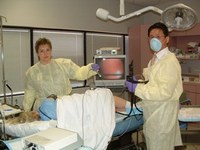Hemorrhoid Care | Skin Surgery | Vasectomy | Reversal | Varicose Veins | Nail | Cysts | Lipoma | Hyperhidrosis | Endoscopy | Joint Pain
Colonoscopy | Gastroscopy
Colonoscopy is a test that examines the lining of the colon for abnormal growths, such as polyps or cancer. A long tube is passed into your bowel, and a light on the end allows the examiner to see the inside of the bowel. If anything abnormal is found, a small biopsy will be done, and polyps or growths can be removed.
Your physician may recommend a colonoscopy for the following:

- Blood in the stool
- A change in bowel habits
- Abdominal pain
- A past or family history of colorectal polyps or cancer • Inflammatory bowel disease (i.e., colitis)
- When polyps or tumors are found on sigmoidoscopy or a barium enema x-ray
- As the part of evaluation of iron deficiency anemia or significant weight loss
- Over 50 years of age and require routine screening (every 10 years)
The colon must be completely clean for the procedure to be accurate and complete. You must follow diet restrictions and a cleansing routine. Tell your doctor about your current medications and any allergies to medications.
Colonoscopy can be done in the office under the conscious sedation,
you will be observed after the procedure until most of the effects of sedation have worn off. Someone will need to drive you home.
FAQ
What is the Conscious Sedation?
Anesthesia is done by placing a needle in the patient’s arm, and the intravenous medications are given to make patients more comfortable. You will be clinically monitored at all times.
What are Polyps? And Why are They Removed?
Polyps are abnormal growths from the lining of the colon that vary in size from a tiny dot to several inches. It’s difficult to tell between a benign and malignant polyp, so they are biopsied or removed by passing special instruments through the colonoscope. Removal of colon polyps is an important means of preventing colorectal cancer.
What are Possible Complications of Colonoscopy?
Symptoms include severe abdominal pain, fever and chills, or rectal bleeding of more than one-half cup. Excessive bleeding, infections, or a tear through the bowel wall are possible as well. Colonoscopy may not catch every abnormality, so call your doctor if you continue to have symptoms.




